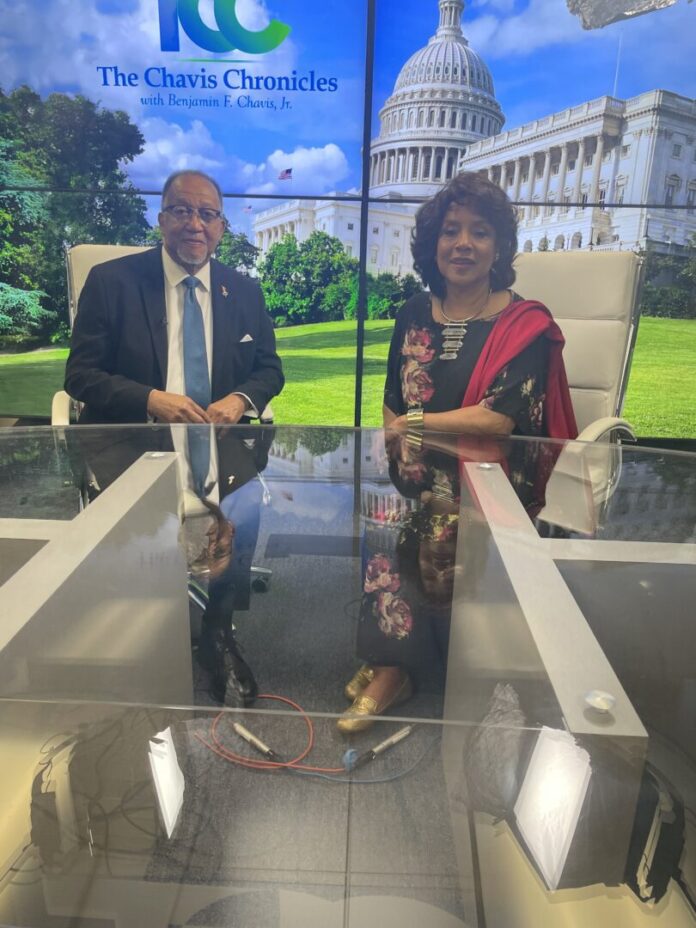
By Stacy M. Brown, NNPA Newswire Senior National Correspondent
Phylicia Rashad, the renowned actress and stage director, has a remarkable journey that has taken her from her birthplace in Houston, Texas, to the pinnacle of success in the entertainment industry. As the current Dean of the Chadwick A. Boseman College of Fine Arts at Howard University, Rashad’s life experiences and accomplishments serve as an inspiration for generations of artists.
Born on June 19, 1948, Rashad’s family background was one of achievement and resilience. Her father, Dr. Andrew Allen, was a dentist, and her mother, Vivian Allen, is an award-winning poet and arts activist. Allen’s poetry, particularly her 1957 publication “Hawk,” has a unique connection to space flight history, and is displayed at the Lyndon B. Johnson Space Center. Highlighting a legacy of family excellence, Rashad’s grandfather, Lloyd Allen, made history as the first African American fireman in the South Pacific.
The entertainer’s educational journey began at Howard University, where she graduated magna cum laude with a B.F.A. degree in 1970. She said the historically Black university holds a special place in her heart, as she later became a beloved teacher there, and now dean. Rashad said her career in the entertainment industry began when she was just 11. Despite initial insecurities about her appearance, she discovered her passion for acting during a school program in Houston.
“When I was 11 years old, beauty meant so much to young girls as my mother was very beautiful and my father very handsome, and my sister was cute as a button,” Rashad explained during an interview at the National Newspaper Publishers Association’s studios in Washington. “All the girls ran after my brother, and when I looked in the mirror, I used to think God must’ve been on lunch break when I was born because I didn’t think I was beautiful,” she said during the 30-minute conversation that will air later this season on PBS-TV’s “The Chavis Chronicles,” hosted by National Newspaper Publishers Association President and CEO Dr. Benjamin F. Chavis Jr.
“I wanted to be like my mother because she was so beautiful, but I had a voice, and my mother insisted on good speech, and my teachers appreciated it, so when I was 11 years old, I was selected for a musical program that involved all the schools in our community,” she recounted. “The teachers rehearsed me early in the morning and after school so when the time came for the program, I knew it by heart. I stood there in the largest hall in Houston at that time in the spotlight for the first time. It was so bright I couldn’t see anything else. I talked to the light every time I got up, and when it was finished and the program was over, the mothers were collecting their children. I heard two of them say ‘oh, there she is, there’s the little girl who spoke so beautifully. Isn’t she beautiful,’ and I thought, wow that’s it; when I grow up, I’ll be an actress. I’ll play in the light and be beautiful all the time, and what I didn’t understand is that it would take some time to realize it had nothing to do with the way I was looking or the dress I was wearing or my hair. It was communication for the heart [and] that’s why I became an actress.”
That defining moment set her on a path to becoming an actress and communicator, using the stage to connect with audiences on a profound level. Rashad’s impact on American culture is perhaps best exemplified by her role as Clair Huxtable on the iconic sitcom “The Cosby Show.” Her portrayal of a strong, loving, and accomplished mother figure resonated deeply with viewers worldwide. Rashad’s work entertained and inspired, breaking down racial and societal barriers.
“On The Cosby Show, I was working with a talented group of young people and a master of comedy and an assembly of writers and a crew of experienced people,” Rashad recounted. “I was working, and it was wonderful work, and that’s how I approached it. It wasn’t until really after those eight years and several years after that that I met people from different places that I began to understand the impact of that show of that production. When I met Nelson Mandela, he said, ‘Thank you. I watched your show with my [prison] guard. It softened him.’”
Rashad speaks highly of today’s young artists, praising their intelligence, openness, and willingness to learn. She emphasized the importance of listening to and supporting emerging talents, recognizing that they are the future of the arts, and stressed the importance of open dialogue and preserving history as critical components of a thriving society. “Thank God there is a sky,” Rashad said, quoting her mother’s book.

